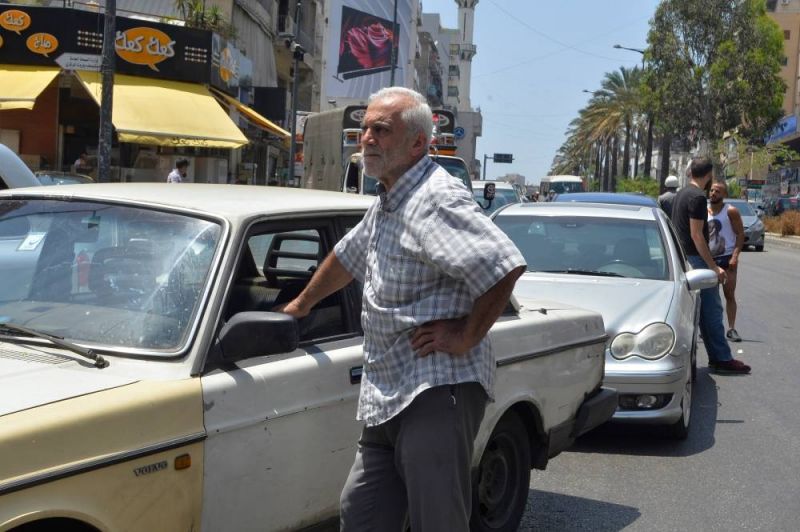
Motorists stand outside their vehicles as they wait in line to buy gas. (Credit: Hussam Shbaro)
Want to get the Morning Brief by email? Click here to sign up.
Fuel importers and the central bank traded fresh accusations of responsibility for fuel shortages forcing drivers to queue in long lines as gas stations ration sales, choking roads across the country. The importers have in recent weeks joined representatives from the electricity and medical sectors in accusing BDL of delaying subsidized dollar payments for essential goods, although Banque du Liban on Thursday again denied that it is delaying payments. BDL issued a statement saying that gasoline, diesel and household gas supplies are 10 percent greater this year than at the same time in 2019, adding that the current fuel supply is enough to meet Lebanon’s demand for at least 10 days. But as the dispute continues and shortages persist, fears are mounting that essential goods subsidies will soon end, wreaking havoc on daily life in the capital and elsewhere.
Meanwhile, pharmacies and hospitals are preparing to pare back their services amid supply shortages in the medical sector. Pharmacy owners throughout the country announced that they would close down shop today and tomorrow, while private hospitals warned that shortages may force them to suspend kidney dialysis operations. The measures are the most recent developments in an ongoing dispute between medical supply importers and Banque du Liban over the alleged subsidy payments. With shortages set to worsen and costs to rise as the economic crisis deepens, Firass Abiad, who heads Rafik Hariri University Hospital, wrote on Twitter that “only a privileged few are now able to afford proper health care,” likening life in crisis-ridden Lebanon to the “feeling of being a passenger on a runaway train gathering speed.”
Difficulties securing foreign currency have also left just six out of 16 cranes at Beirut port operational. The International Chamber of Navigation in Beirut warned of a decline in services provided by the port’s container terminal as the port administration struggles to pay suppliers overseas for spare parts to repair not only cranes but also machinery and locomotives. The chamber called on officials to intervene immediately and find an appropriate solution, noting that a decline in services will have dire repercussions on workers in the maritime transport sector as well as on importers and exporters. Approximately 70 percent of the country’s imports and 80 percent of its exports transit through Beirut port.
Emmanuel Macron said that France is working with international partners to find a financial mechanism to ensure Lebanon’s crumbling public services continue to function. At a press conference yesterday, the French president said that “if the absence of government persisted, we could succeed in preserving a system under international constraint.” Since the Beirut port explosion on Aug. 4 last year, Macron has been leading efforts to pressure Lebanese politicians to form a cabinet capable of enacting key reforms. These efforts have so far been unsuccessful — yesterday marked 10 months since Lebanon had a fully empowered government.
A spokesperson for the International Monetary Fund yesterday questioned the value of Lebanon implementing a capital control law in the absence of comprehensive economic reforms. Gerry Rice was commenting on a draft capital control law presently making its way through Parliament, as well as on a new BDL circular regarding deposit withdrawals. Speaking at an online conference, Rice said, “It is not clear how the contemplated withdrawal of dollars will be financed given the sharp decline in the availability of foreign currency over the past two years.” Rice also said that it is unclear to the IMF how helpful a capital control law would be without the support of fiscal, monetary and exchange rate policies. Negotiations between Lebanon and the IMF broke down a year ago following disagreement over the government’s figures for the country’s financial losses and those presented by the central bank, banking sector and some political figures.
The Health Ministry is holding its third COVID-19 vaccination “marathon” this weekend, offering the Pfizer vaccine to adults aged 55 and older as well as people with disabilities. Caretaker Health Minister Hamad Hassan said 20,000–25,000 people are expected to be vaccinated during the two-day vaccine drive. By comparison, the first Pfizer marathon, held last weekend for individuals aged 60 and older, succeeded in vaccinating 2,690 people. Participating hospitals will accept patients from 8 a.m. to 6 p.m. on a walk-in basis, as long as they are registered on the Impact platform. A list of hospitals taking part in the drive can be found here.